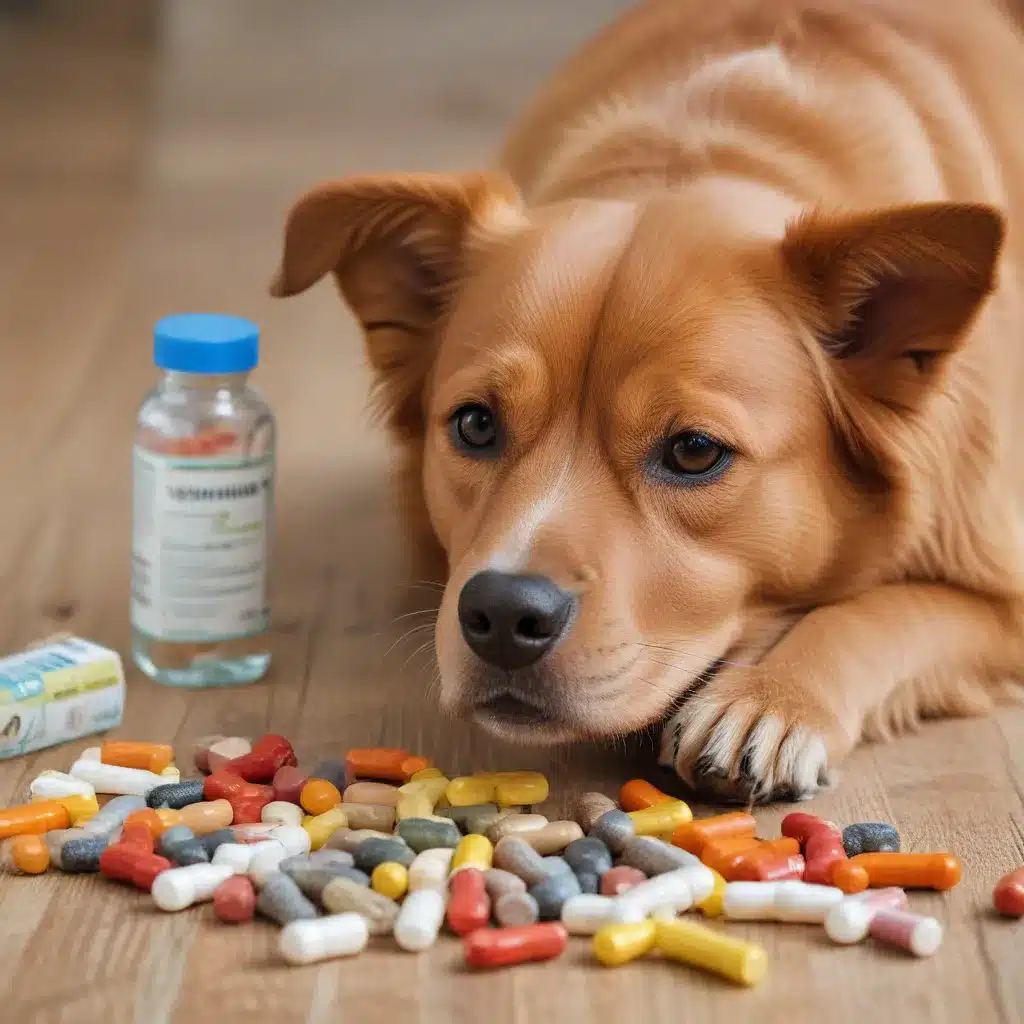
The Vitamin Aisle Dilemma
As I strolled down the vitamin aisle at my local pet store, I was greeted by a dizzying array of options – from glucosamine and chondroitin to omega-3s and antioxidants. It was enough to make my head spin! Being the devoted dog mom that I am, I couldn’t help but wonder, “Do my pups really need all these fancy supplements?”
It’s a question that plagues many pet parents like myself. With the dog vitamin and supplement market booming, it can be tough to separate the essential from the extraneous. Do our canine companions truly benefit from these extra nutrients, or is it all just a fancy marketing ploy?
Well, my fellow dog lovers, fear not! I’ve done the research to get to the bottom of this supplement saga. Let’s dive in and uncover the truth about what’s really going on in the world of dog vitamins and supplements.
The Nutritional Needs of Our Furry Friends
First things first – let’s talk about the basic nutritional requirements of our beloved pups. Just like us humans, dogs need a balanced diet filled with the six essential nutrients: water, protein, fats, carbohydrates, vitamins, and minerals.
Now, the good news is that most commercially available dog foods are formulated to provide a complete and balanced diet, containing all the necessary vitamins and minerals. So if your pooch is chowing down on a quality kibble or canned food, they’re likely getting everything they need straight from their bowl.
However, the story changes a bit for our canine companions who dine on a homemade diet. According to WebMD, these pups may require additional supplementation to ensure they’re meeting their vitamin and mineral needs. That’s where dog-specific vitamins and supplements can come in handy.
When Supplements Shine
While a well-balanced commercial diet may be sufficient for most healthy dogs, there are certain cases where supplements can truly make a difference. Here are a few scenarios where your vet might recommend adding some extra nutrients to your pup’s regimen:
Medical Conditions: Dogs with specific health issues, like joint problems or skin allergies, may benefit from targeted supplements like glucosamine, chondroitin, or omega-3 fatty acids. PetMD explains that these nutrients can help slow the progression of disease or support the body’s natural healing processes.
Homemade Diets: As I mentioned earlier, pups on a homemade diet may require additional supplementation to ensure they’re getting all the vitamins and minerals they need. The American Kennel Club advises working closely with your veterinarian or a veterinary nutritionist to determine the right supplementation plan for your homemade-fed pup.
Life Stages: Puppies, senior dogs, and even pregnant or nursing females may have unique nutritional requirements that can be met with the help of targeted supplements. For example, Hill’s Pet Nutrition notes that glucosamine and chondroitin can be especially helpful for older dogs with joint issues.
So in these instances, supplements can be a valuable tool in supporting your dog’s overall health and wellbeing. But as with anything involving our furry friends, it’s crucial to work closely with your veterinarian to ensure you’re providing the right nutrients in the right amounts.
The Pitfalls of Over-Supplementation
Now, before you go loading up your pup’s daily regimen with every vitamin and mineral under the sun, let’s talk about the potential dangers of over-supplementation.
You see, just like us humans, our canine companions can run into trouble if they consume too much of certain nutrients. For example, WebMD warns that excessive vitamin A can lead to dehydration, joint pain, and even damage to blood vessels. And too much calcium can cause skeletal problems, especially in large-breed puppies.
That’s why it’s so important to always consult with your veterinarian before adding any new supplements to your dog’s diet. They’ll be able to assess your pup’s individual needs and recommend the appropriate dosage and type of supplement, if any.
And speaking of types of supplements, it’s crucial to steer clear of human vitamins and stick with canine-specific formulas. Hill’s Pet Nutrition cautions that human supplements often contain different concentrations of vitamins and minerals than what’s safe for dogs. Plus, they may even include ingredients that are downright toxic to our four-legged friends.
So, in the world of dog vitamins and supplements, less is often more. Work closely with your vet, stick to reputable brands, and resist the temptation to turn your pup into a canine superhero with a pantry full of pills and powders.
The Verdict: Proceed with Caution
At the end of the day, the decision to supplement your dog’s diet really comes down to their individual needs and the guidance of your trusted veterinarian. For most healthy pups on a quality commercial diet, additional vitamins and minerals may not be necessary.
However, for those dogs with specific health conditions or dietary requirements, supplements can be a game-changer in supporting their overall wellbeing. Just be sure to do your research, consult your vet, and always err on the side of caution when it comes to your furry friend’s nutritional needs.
And remember, a trip to iHaveDogs.com might be just the thing to round out your pup’s healthy lifestyle. Who knows, you might even find the perfect four-legged companion to share your supplement-fueled adventures with!
So there you have it, my fellow dog lovers – the scoop on dog vitamins and supplements. Now go forth and make informed decisions about your pup’s nutritional needs. Your canine companions will thank you for it!

